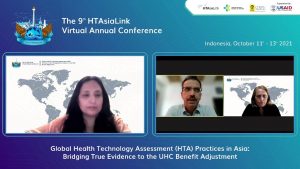Advancing Health Technology Assessment in Asia for Sustainable UHC
As countries move toward universal health coverage (UHC), they are facing an increasing need for health care among their population. For low- and middle-income countries (LMICs), achieving the UHC goal sustainably is particularly challenging as they have to deal with allocating and managing limited resources.
Health Technology Assessment (HTA) is a valuable tool for those making difficult budget distributional decisions. HTA is a means of informing systematic and transparent priority setting processes that uses explicit methods to determine the value of a health technology. “Health technology” in HTA includes a test, medicine, device, vaccine, procedure, program, or system. To support countries in the Asia region with implementing HTA on their journey to UHC, the US Agency for International Development (USAID) Medicines, Technologies, and Pharmaceutical Services (MTaPS) Program is collaborating with HTAsiaLink—a forum for HTA agencies in the Asia-Pacific region. The forum is working to advance HTA research and implementation in the region through collaborative research.
As part of this collaboration, MTaPS hosted a workshop at the 2021 HTAsiaLink Conference titled “Health Technology Assessment pathways in LMICs: Scaling up for sustainability of UHC in Asia” on October 11, 2021. Held in partnership with the Indonesian Ministry of Health, the event convened 220 participants from the Asia region, along with global stakeholder organizations, to discuss the progress of HTA in Asia. The event, conducted in English with simultaneous interpretation in Bahasa Indonesia, Tagalog, Thai, and Vietnamese, aimed to raise awareness of pathways, processes, policy options, and best practices for scaling HTA to LMICs and to convene diverse HTA stakeholders, including policy makers; HTA agency personnel; academia; and the private sector (e.g., manufacturers, manufacturer associations).
The MTaPS event oriented attendees to a stepwise approach to implementing HTA and existing tools to support users in deciding why, when, and how to develop their own HTA methods. Case studies from India and Ukraine illustrated the pathways to HTA institutionalization and the challenges and successes therein.
“The HTA institutionalization in Ukraine sets an excellent example for an LMIC that has recently succeeded in developing a strong HTA function. The HTA department that was founded in early 2019 has already proven its success with strong capacity and visible impact on creation of lists of pharmaceuticals under public coverage. The Ukrainian experience of how the legislative and institutional changes came about shows that a strong and quick step can be taken towards an evidence-based policy making ecosystem with high political will and use of the right strategies,” stated Rabia Kahveci, USAID SAFEMed Activity Senior Technical Advisor, Pharmaceutical Policies and Governance, sharing the experience of Ukraine.
The shared insights and experiences led to rich discussion in breakout sessions on investments needed to support HTA, the global movement toward HTA, experience in the institutionalization of HTA, and the status of HTA in Asian countries.
“This event provides the much needed forum for countries in the Asia Pacific region to learn from each other and together advance their progress to HTA institutionalization towards a more efficient and effective health care system which will ultimately improve health for the people,” said Christian Suharlim, MTaPS’ HTA activity lead and Senior Technical Advisor in Pharmaceutical Economics and HTA at Management Sciences for Health (MSH).
Key Takeaways from the Event
- UHC benefit packages vary among countries. Each has different needs and priorities, resulting in different recommendations depending on the country’s situation.
- It is important to understand the mandate of an organization that is utilizing HTA.
- Countries with different income levels tend to use HTA for different purposes, reflecting the variability of needs for HTA.
- HTA is linked to decision making at both the macro and micro levels of hospitals, and the adoption of HTA is highly contextual. It is advised to start incrementally with a situational analysis and capacity assessment.
- Sharing real life examples is crucial to understand the process for countries new to HTA and how to adapt it to their own context.
- Stakeholder involvement is key in all aspects of HTA institutionalization. It is quintessential across the HTA process, including institutional set up and collecting and contextualizing evidence.
- Stakeholder collaboration is an enabler to political will to support UHC.
- HTA networks and international agencies can act as advisors for countries in institutionalizing HTA, but the decision should be made by the country’s stakeholders to ensure a better fit with its situation and needs.
Advancing the HTA Agenda: Next Steps
This event is the first in a series to support HTA and priority setting in Asia, with a second deep-dive session to be conducted in early 2022.
A key focus is to further augment the practical guide for policy action in LMICs, co-developed by USAID through MTaPS and MSH with contributions from global experts in the HTA field. “A Roadmap for Systematic Priority Setting and Health Technology Assessment (HTA)” lays out a stepwise approach to HTA implementation that allows countries to take advantage of existing tools and create political momentum that favors HTA.
Supporting optimization of resource allocation is a key MTaPS objective as part of its mission to strengthen pharmaceutical systems in LMICs. Working with countries in Asia and Africa on the adoption of HTA will enable evidence-informed, transparent, and accountable priority setting, which will improve access to lifesaving health technologies in the countries and enable sustainability of UHC.
MTaPS is building on the efforts of the USAID SAFEMed Activity in successfully institutionalizing HTA in Ukraine. Implemented by MSH, the project helped establish an HTA agency in Ukraine that is enabling evidence-based health policy making and ensuring that Ukrainians have sustainable access to lifesaving medicines, such as for HIV/AIDS.
